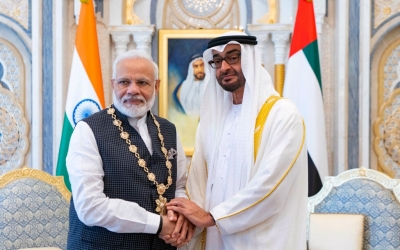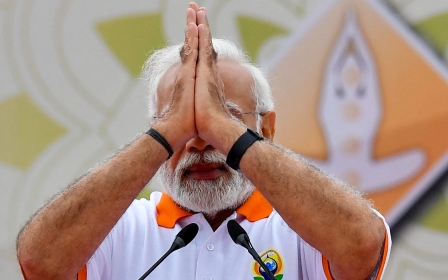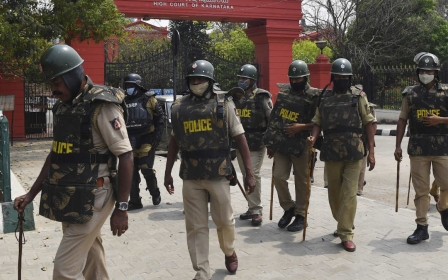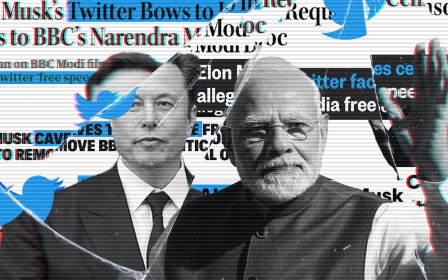Human rights concerns overshadow Modi's upcoming White House visit
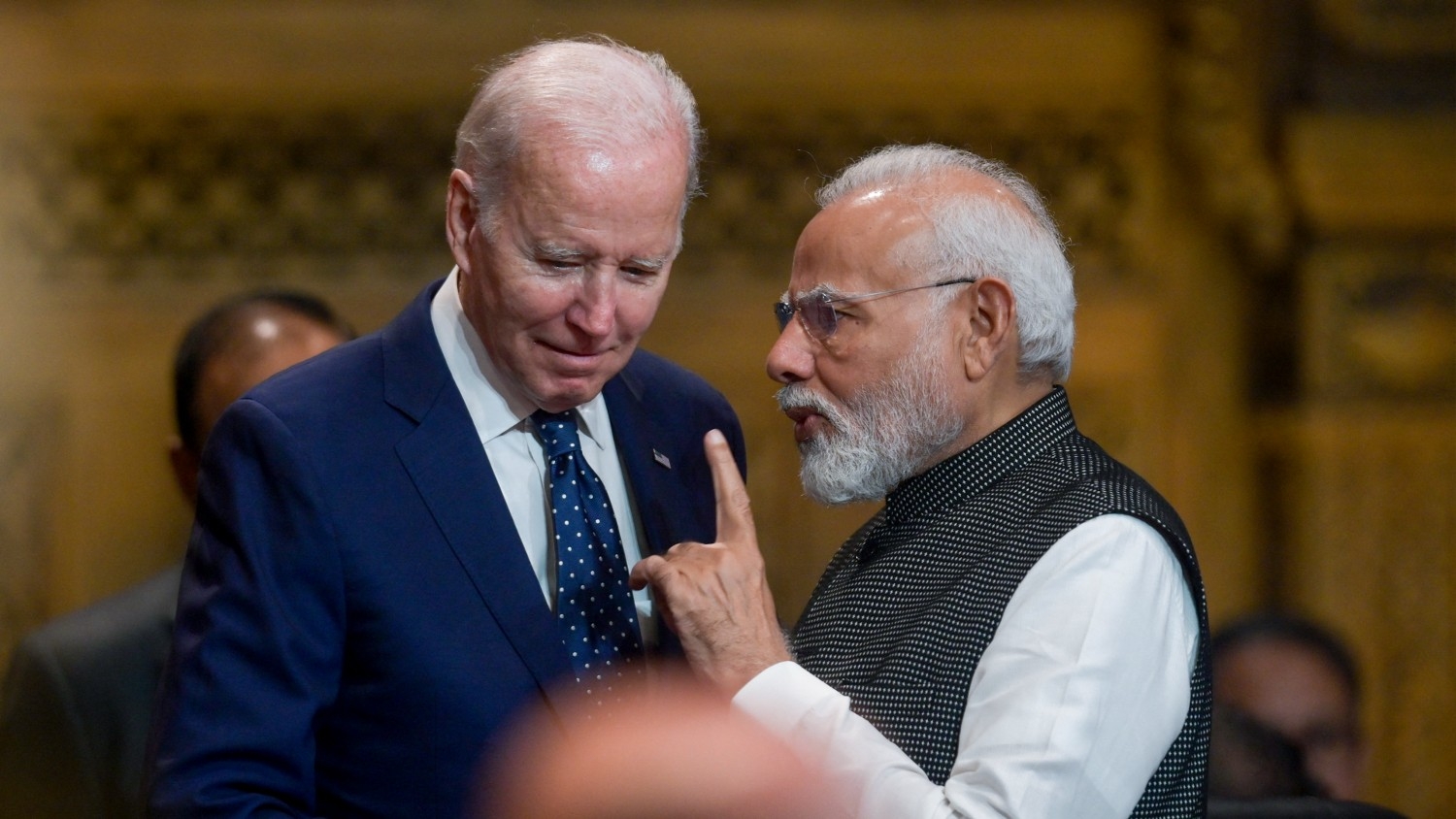
As Indian Prime Minister Narendra Modi and US President Joe Biden are set to meet this week at the White House, a litany of rights groups and lawmakers are urging Biden to discuss New Delhi's crackdown on human rights.
Modi is arriving in Washington Thursday for a visit to the White House, where he will meet with Biden for a state dinner and address a joint session of Congress.
The meeting, his second since becoming prime minister, comes as Washington is aiming to court New Delhi away from Russia's defence sector. The US has been aiming to push a multibillion-dollar sale of armed drones to India, according to Reuters, and will also discuss India's burgeoning pact with Israel and the United Arab Emirates.
Ahead of Modi's visit, several human rights groups have mobilised in opposition, hoping to raise awareness about the Indian government's crackdown on minority groups.
Under the prime minister, India has undertaken a major crackdown on civil society that has particularly affected members of the country's religious minorities, including Muslims.
More than 60 organisations have signed an open letter to the US president urging him to raise the issue of human rights in India and press Modi's government to "halt the use of anti-terror laws to arbitrarily detain political critics".
"Given the urgency of this crisis, we ask you to engage directly with Indian-American and human rights civil society leaders to explore solutions to address India's human rights crisis," the letter reads.
"We also ask you to employ the tools at your disposal to ensure that the Indian government cannot attack Indians’ human rights with impunity."
Another letter signed by more than 70 US lawmakers from both the House and Senate issued a similar call to Biden.
'Raise religious freedom directly'
In August 2019, New Delhi revoked Article 370 of India's constitution, the clause that granted Kashmir's Muslim-majority region semi-autonomous status within the Indian Union.
That same year, India also introduced the Citizenship Amendment Act, which India says makes it easier for people from non-Muslim minority groups in Afghanistan, Bangladesh and Pakistan - who settled in India prior to 2015 - to get Indian citizenship. Rights groups have argued that the act's exclusion of Muslims violates India's secular constitution by making religion a basis for citizenship.
India has also topped the list for the highest number of internet shutdowns in the world for five years in a row, including in 2022, internet advocacy watchdog Access Now says.
On Tuesday, ahead of the visit, Human Rights Watch is hosting a screening of the BBC documentary on Modi's role in the 2002 Gujarat riots, when communal violence left more than 1,000 people - mostly Muslim - dead. The film was banned in India.
The US Commission on International Religious Freedom (USCIRF) has also stepped in, issuing a statement calling on Biden to publicly comment on the attacks on religious freedom in India.
"It is deeply concerning that the Indian government continues to implement policies that negatively impact Christians, Muslims, Sikhs, and Hindu Dalit communities," USCIRF commissioner Stephen Schneck said in a statement.
"During this state visit, we ask President Biden to raise religious freedom with Prime Minister Modi directly, including by urging him to amend or repeal policies that target and repress religious minorities."
And later in the week, a coalition of rights groups is holding a demonstration in front of the White House to protest the visit.
Two decades ago, the US did take a stand for human rights in India when it banned Modi, who was then the chief minister of the Indian province of Gujarat, for his culpability in the 2002 Gujarat anti-Muslim pogroms.
But since then, Washington has welcomed Modi into the US with open arms, and the prime minister has travelled to the US and spoken to sold-out crowds of tens of thousands of his supporters.
I2U2: The new quad
Modi's visit to Washington is also the culmination of a growing partnership between India, the US, Israel, and the United Arab Emirates, which kicked off in October 2021.
The pact, referred to as I2U2, is a companion to a Quadrilateral Security Dialogue (the quad), made up of Australia, India, Japan, and the United States, whose goal is to build up a buffer against China in the Pacific.
Since it was announced, the countries convened for its first summit in July 2022, and have engaged in several meetings since.
The US hopes that the pact will be able to build on the already established country-to-country relations that the four nations have with each other and create a geopolitical and economic counterweight to countries like Iran and Turkey and their strategy in Asia and the Middle East.
After the establishment of the I2U2 framework, the four countries have grown closer in both economic ties and in the defence sector.
Earlier this year, Indian tycoon Gautam Adani acquired a majority stake in the Haifa port for $1.2bn. The deal was one of the biggest foreign investments by an Indian in any Israeli sector.
India has also become Israel's biggest customer for weapons, spending in excess of $1bn per year.
And in March this year, Emirati property giant, Emaar, revealed plans to build a shopping mall and an office complex in Srinagar, the capital of the Indian-administered Jammu and Kashmir region.
In February, the US State Department participated in an inaugural business forum in the I2U2, where the sides discussed "investment opportunities to address some of the regions' most pressing issues, including management of the energy crisis and food insecurity".
Countering China and Russia
While threats to religious freedom in India are a major concern for rights groups, the US has seldom been critical of New Delhi in recent years, as Washington has looked to the South Asian country as a bulwark against its rival in China.
“Now, we know that India and the United States are big, complicated countries,” Secretary of State Antony Blinken told the US-India Business Council in Washington, ahead of Modi’s visit.
“We certainly have work to do to advance transparency, to promote market access, to strengthen our democracies, to unleash the full potential of our people. But the trajectory of this partnership is unmistakable, and it is filled with promise.”
'We know that India and the United States are big, complicated countries'
- Antony Blinken, US secretary of state
Earlier this month, US Secretary of Defence Lloyd Austin visited India, where he discussed boosting ties with his Indian counterpart in order to counter Beijing's presence in the South Pacific.
The US is also looking to lure India away from its security ties with Russia. The US has been leading efforts to counter Moscow's invasion of Ukraine which began last February.
Russia and India have maintained close defence ties over the past several decades, dating back to the Soviet Union. For example, one of India's most coveted weapons is the BrahMos, a supersonic cruise missile named after the Brahmaputra River in India and the Moskva River in Russia.
Due to these ties, India has refrained from joining the US and other western countries in condemning Russia's invasion of Ukraine.
Still, Washington has looked to ensure its relationship with India is not damaged by their different responses to the Ukraine War. While US law requires the government to issue sanctions against countries that buy weapons from Russia, the House of Representatives passed a resolution that would waive such sanctions against India.
It is also looking to secure a number of arms sales to India. Bloomberg reported last week that India had cleared the purchase of 30 American armed drones.
During an interview with the Wall Street Journal, Modi was asked about New Delhi not taking a more forceful stance against the invasion of Ukraine and how the US has been critical of this. Modi replied: "I don't think this type of perception is widespread in the US."
Middle East Eye propose une couverture et une analyse indépendantes et incomparables du Moyen-Orient, de l’Afrique du Nord et d’autres régions du monde. Pour en savoir plus sur la reprise de ce contenu et les frais qui s’appliquent, veuillez remplir ce formulaire [en anglais]. Pour en savoir plus sur MEE, cliquez ici [en anglais].


